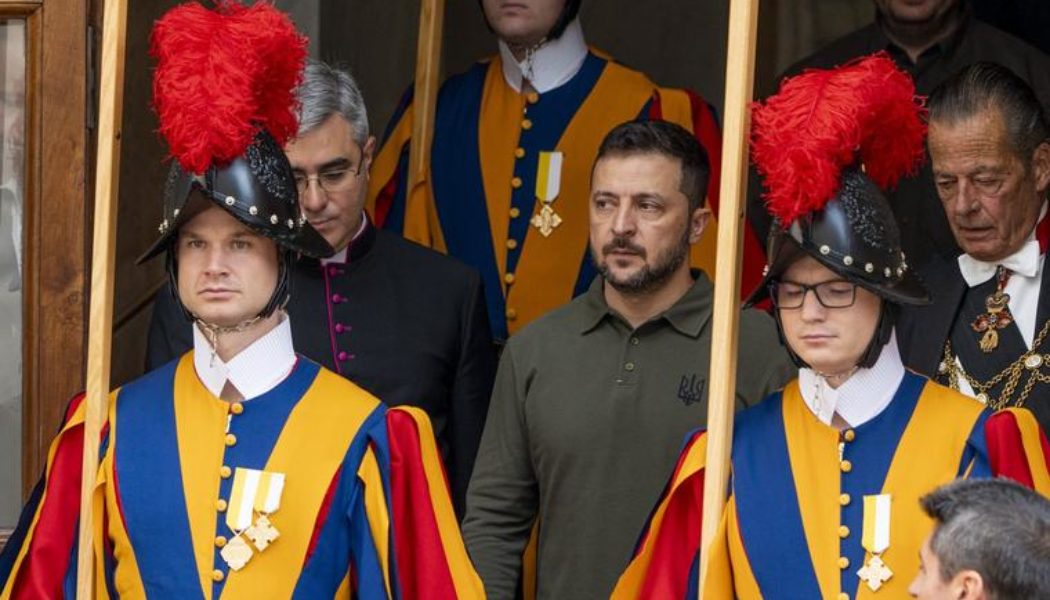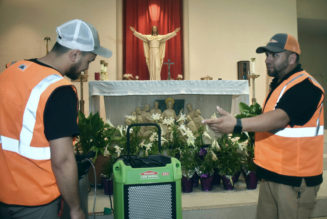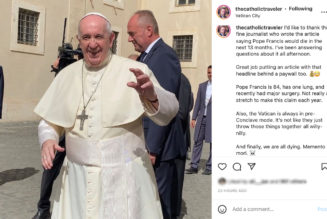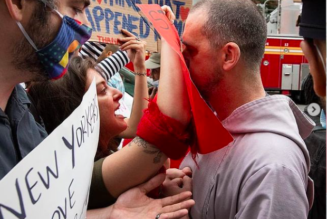
As the brutal fighting in Ukraine approaches its third winter with no end in sight, the Vatican has once again dispatched Italian Cardinal Matteo Maria Zuppi to push for peace.
Cardinal Zuppi, who is Pope Francis’ special envoy to Ukraine, embarked on his second visit to Moscow on Monday, where he will “assess further efforts to facilitate the reunification of Ukrainian children with their families and the exchange of prisoners, with a view to achieving the much-hoped-for peace,” according to Matteo Bruni, director of the Holy See Press Office.
One million people have now either died or been injured as result of the conflict in Ukraine, according to recent estimates, including 200,000 dead Russians and 80,000 dead Ukrainians. Ukrainian infrastructure has also been severely damaged, as long-range Russian missile strikes on the Ukrainian power grid have knocked out 70% of nation’s energy-generation capacity, according to the United Nations — a fact that could cause millions to flee their homes in the brutal cold of the approaching Ukrainian winter.
Neither side has appeared willing thus far to curb their demands to begin the process of negotiated peace. As preconditions for any peace talks, Ukraine has insisted that Russian troops leave the Eastern European country, that it recognizes the 1991 borders between the countries, and that it pays reparations for the war and faces justice through international tribunals. For its part, the Kremlin has demanded Ukraine cede its lost territory and more, in addition to ending its ambitions to join NATO.
The chasm has left foreign-policy experts flummoxed as to how this conflict will be able to move closer to a resolution — or at the very least, to a “new normal” in which the fighting is isolated to a singular front line to reduce the suffering of innocent civilians.
Long-Range-Missiles Request
Russia continues to enjoy several strategic advantages in the conflict, including a larger economy due to its vast energy exports, its naval superiority and control of the Black Sea, and its nuclear deterrent, which prevents Ukraine’s Western allies from escalating the conflict in a manner that would endanger the rule of the current Russian regime. But above all, Russia, whose population is more than three times larger than Ukraine’s, has vastly superior manpower and can sustain greater losses in the trenches.
Aware that his country cannot sustain a war of attrition against its much larger enemy, Ukrainian President Volodymyr Zelenskyy has engaged in talks with the U.S. and other allies to secure permission to use long-range missiles to strike inside the Russian mainland. The U.S. has thus far withheld its support for this type of escalation, though European powers are currently split on the issue, with Germany taking a hard line against lifting the weapons restriction and the U.K. appearing to favor approval for the long-range missiles, though they have yet to make a formal decision.
In recent months, the predominantly Catholic nation of Poland has come out strongly in favor of lifting the weapons restrictions on Ukraine. The nation has seen its relations with its neighbor Russia deteriorate since the invasion in 2022. In response to the perceived threat faced from Moscow, Poland has ramped up its defense spending and transitioned away from Russian oil. It joins Finland and the Czech Republic in calling for the long-range-weapons approval.
As it has awaited a final decision on the use of long-range missiles, Ukraine has attempted to push into the Russian mainland to improve its position. The Kursk Oblast incursion in August, which saw Ukrainian forces enter Russian territory and seize several settlements across hundreds of kilometers, exposed Russian border-security issues but also Ukraine’s own military shortcomings. Ukrainian forces have been lauded for grit and tactical prowess, but have neither the manpower nor the weaponry to sustain an offensive in enemy territory. And without the ability to strike deep inside of Russia, Ukraine is forced to remain in the trenches, where Russia can grind down Ukrainian forces in slow-moving and brutal combat.
According to Jakub Grygiel, a professor of politics at The Catholic University of America, Ukraine’s attempt to secure approval for long-range missile use is not about invading Russia but defending itself against further aggression.
“Ukraine does not have the desire or the ability to invade Russia,” he told the Register. “They conquered a few square miles of Russian territory mostly for negotiating purposes. The desire instead is to strike logistical hubs that the Russian military has on Russian territory. Inside of their territory, the Russian military has almost a sanctuary where they can do whatever they want. They can prepare an offensive, place all their planes, armor and ammunition in close proximity to Ukraine.”
So far, the Biden administration has resisted giving Ukraine permission to use long-range missiles to strike inside the Russian mainland, saying that it needs more clarity from Ukraine on how it plans to use the weapons and how long-range strikes would fit into a larger strategy to win the war. Experts believe the Biden administration has rebuffed the request because it fears sparking a larger conflict, one in which Russian President Vladimir Putin might be compelled to use smaller, tactical nuclear weapons to repel the threat. The White House has also shared concerns that loosening restrictions would have negligible impact on the broader conflict while significantly raising the risk for dangerous escalation.
For Grygiel, the Biden administration’s approach is shortsighted.
“It’s a fearful Western approach to arming Ukraine,” Grygiel said. “They are afraid of the potential Russian response. But to me it’s not justified. Putin has made multiple warnings over the years, but they haven’t escalated. And so the U.S. has moved very slowly, drop by drop, so that whatever action we do, it’s always too late, sometimes a year later than when it was needed.”
While the Kursk incursion has been seen as a short-term tactical success for the Ukrainians — its initial success forced Russia to shift resources toward border defense and disrupted Russia’s supply lines — it has failed to meaningfully alter the strategic trajectory of the conflict. Thousands of Ukrainians continue to die per month. Ukraine’s infrastructure continues to deteriorate under a constant barrage of drone strikes. And Putin’s massive nuclear arsenal continues to keep Ukraine’s Western allies from intervening directly.
According to Lise Howard, professor of government and foreign service at Georgetown University, Ukraine’s aims remain unchanged, which contributes to the quagmire.
“For Ukraine, it’s quite simple,” she told the Register. “They want sovereignty and territorial integrity, which are the basic rules of the road for the international system, which is what all states since World War II have pledged to uphold. They also want membership in NATO, which goes beyond those two basic rights. For Putin, that’s a red line, and many Western policymakers are wary of that ask.”
Russia Pushes Ahead
Putin has on multiple occasions stated that he is willing to enter into peace negotiations, though Western officials do not believe he is acting in good faith. His most recent declaration of openness to peace talks in early September coincided with Zelenskyy’s recent trip to the U.S., in which the Ukrainian leader made his case for striking inside of Russia, leading many to believe his comments were aimed toward U.S. politicians who have grown increasingly weary of funding and arming Ukraine. Since the start of the war, the U.S. has given Ukraine more than $175 billion in aid and military assistance.
According to British Defense Secretary John Healey, Russian artillery is currently outfiring Ukraine by 3-to-1. He also estimates Russia will conscript or recruit an additional 400,000 soldiers in the coming year, far more than Ukraine can hope to produce. Both claims portend to further difficulties for Ukraine, which would struggle to sustain such disadvantages in the long term.
Russia also enjoys the backing of a strong network of global allies. Since the war in Ukraine began, it has received substantial aid from North Korea and Iran and especially China. Just days before Russia invaded Ukraine in February 2022, China and Russia declared a “no-limits” partnership. And in May this year, Putin and Chinese President Xi Jinping signed a joint statement declaring a “new era” of opposition to American global hegemony on a host of fronts, including the war in Ukraine.
While the outcome of the war has implications far beyond the region, a victory in Ukraine would provide Russia with numerous spoils. Having struggled with population decline long before the fighting began, Russia might move to absorb Ukraine’s 38 million individuals (about twice the population of New York) and further consolidate the Slavic core of the region. Ukraine is also a key regional producer of food, oil and fertilizer, which would provide a boost to Russian resources.
For Putin, who was an intelligence officer for the KGB during the Cold War, as well as for numerous Russian elites, Ukraine’s stated aspiration to join NATO is a major obstacle for easing tensions.
“For Russia, the extent to which it fears NATO is irrational,” Howard said. “NATO is a defensive alliance. It’s not going to attack Russia. There’s no evidence, no basis in reality for thinking NATO would attack Russia.”
The U.S. Election
The outcome of the U.S. presidential election stands to play a significant role in shaping U.S. policy toward Ukraine. While neither Vice President Kamala Harris or former president Donald Trump has offered many specifics in regard to Ukraine policy, experts assume Harris’ approach would not differ significantly from Biden’s — which has been to arm Ukraine just enough to keep it from falling, while not enough to raise its prospects of eventual victory — while Trump would likely pull support from Kyiv and force peace negotiations.
An EWTN News/Real Clear Opinion Research poll from August showed a near even split among Catholic voters on the favored approach to Ukraine, with 37% of Catholic voters believing the U.S. is providing too much support to Ukraine, 36% thinking it is giving about the right amount of support to Ukraine, and 28% thinking the U.S. is not providing enough support to Ukraine.
“I watched this poor guy [Zelenskyy] yesterday at the United Nations. … They’re locked into a situation. It’s sad,” the former president recently said. “They just don’t know what to do. Because Ukraine is gone. It’s not Ukraine anymore. You can never replace those cities and towns. And you can never replace the dead people — so many dead people. Any deal, even the worst deal, would have been better. … We continue to give billions of dollars to a man who refuses to make a deal, Zelenskyy. There was no deal that he could have made that wouldn’t have been better than the situation you have right now. You have a country that has been obliterated.”
Speaking with Zelenskyy at her side in a late-September meeting, Harris vowed to continue the Biden administration’s support of Ukraine, while characterizing Trump’s vow to facilitate a negotiated peace as a strategy of “surrender.”
“There are some in my country who would instead force Ukraine to give up large parts of its sovereign territory, who would demand that Ukraine accept neutrality, and would require Ukraine to forego security relationships with other nations,” she said. “These proposals are the same of those of Putin. And let us be clear: They are not proposals for peace. Instead, they are proposals for surrender, which is dangerous and unacceptable.”
Papal Pursuit of Peace
Zelenskyy also recently met with Pope Francis for the fourth time since the fighting began. The two spoke privately for 35 minutes at the Apostolic Palace. Pope Francis has condemned the war and made previous calls for peace, though a comment he made this spring about war combatants “finding the courage to wave the white flag” drew sharp rebukes from Ukrainian officials and the head of the Ukrainian Greek Catholic Church. The Vatican later clarified the comment, saying that Russia “should first and foremost cease fire.”
Cardinal Zuppi’s visit to the region signals that the Vatican’s efforts to bring about an end to the conflict have not been hampered by the episode. Vatican News reported that Cardinal Zuppi’s last visit bore fruit, saying that, “thanks to the channel opened by Zuppi, a certain number of Ukrainian children brought to Russia by the occupation forces were able to return home.”









